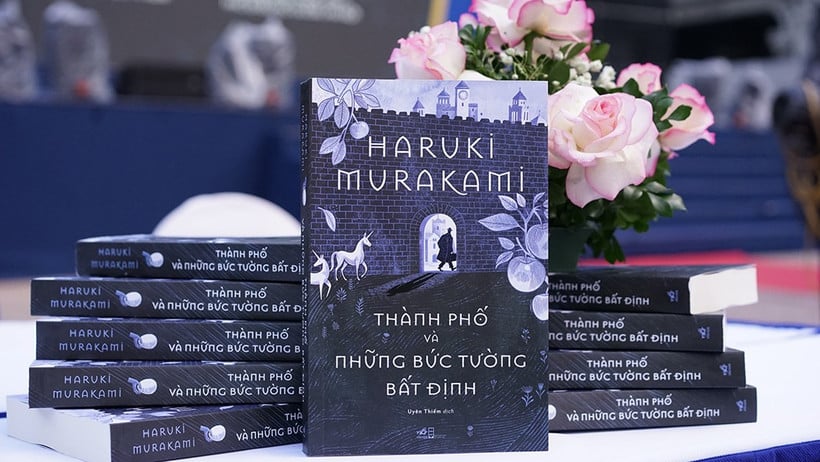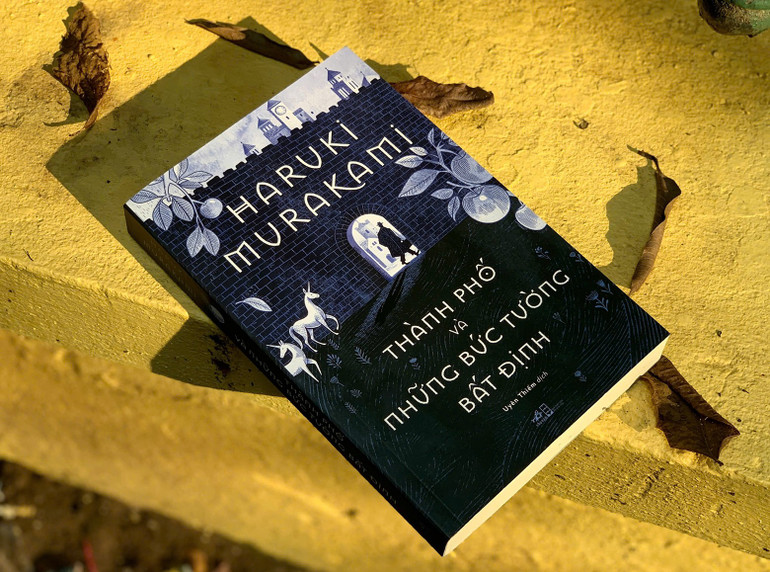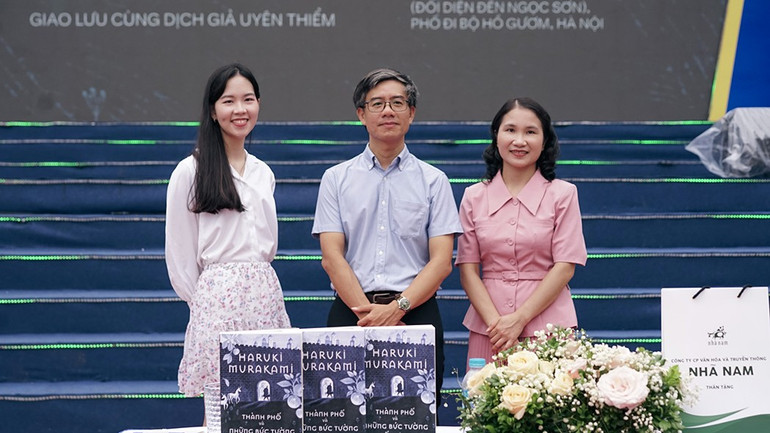
The work “City and Uncertain Walls” is a special work in Haruki Murakami’s career. The work originated from a short story he wrote when he was young, then expanded into a short novel published in 1980, but was “forgotten” by the author for many decades.
After many years, he returned to the work and rewrote it into a complete novel, like a dialogue between himself as a young man and himself at the age of 75. Therefore, the novel has a very unique color: both vague and surreal, familiar, and calm and mature.
It is the experience of youth and contemplation in later years that creates a parallel between Haruki Murakami's surrealism and the obsessions of modern life, making the work both nostalgic and contemporary.

Talking about the experiences of two ages included in the novel, Dr. Tran Thi Thuc, a lecturer at the University of Social Sciences and Humanities, said that by rewriting an old work, Murakami wanted to test how “today’s me” would respond to “me at seventeen or twenty”. Therefore, “The City and the Uncertain Walls” contains a strange energy: clear, wandering, but no less profound and experienced.
Murakami has led readers into the world of consciousness with “The City and the Uncertain Walls”. The work is like a dream, where readers are invited to cross the boundary between reality and fantasy, between memory and oblivion, to face the deepest part of themselves. Murakami does not give a single answer to the questions. Instead, he opens up a narrative space, for readers to reflect, feel and interpret the pain and regrets.
Therefore, “The City and the Uncertain Walls” is not only a journey of an anonymous character searching for love and the meaning of life, but also a spiritual experience where readers are invited to dialogue with faded memories, invisible walls in the soul, and even the pains they tried to hide.
The image of “invisible walls” is an important symbol in the work, representing the barriers that people build in their minds: fear of failure, self-consciousness, invisible social pressures or unhealed mental wounds. These walls make the story more familiar, reflecting real life, where everyone has to face internal and external limitations.
The journey through these invisible walls shows that every loss, every loneliness or limitation can become a driving force for growth, for finding connection and compassion.
Despite being filled with loneliness and loss, the work still sows rays of hope. The city in the work is not only an old place, forgotten by time, but also a space for people to find each other, to realize the value of memory and presence. The characters in the city, though lost, lonely or carrying mental wounds, still have the opportunity to find connection and experience compassion.
Sharing about the process of translating the book, translator Uyen Thiem admitted that this was a “difficult and strange” translation. He said that Murakami used the narrator as part of the psychological structure. The original Japanese version constantly changed the narrator, sometimes “you - me”, sometimes returning to “I - she”. This made the translator pay special attention so as not to confuse the boundary between memory and the present, between intimacy and distance. In the beginning, Murakami used more intimate forms of address, as if the two people used to know each other, but when the character entered the “city”, the form of address became more distant.

Translator Uyen Thiem also believes that Murakami’s writing style is somewhat similar to Western prose thinking. According to him, the “Western hybrid” in Murakami’s literature does not obscure Japanese identity, but on the contrary helps him expand the range of expression of contemporary literature. Thanks to that, the questions in his works are no longer limited to the borders of a single country, but touch the universal experience of people around the world.
Translator Uyen Thiem also cited details from his memoir “The Novelist Profession”, where Murakami revealed his habit of writing the first draft in English and then translating it back into Japanese. According to Uyen Thiem, this partly explains Murakami’s “very Western” writing style, restrained, clear and with a rhythm close to Western prose thinking.
The translator also added that by Murakami’s time, the Japanese language had undergone many changes, becoming more flexible and strongly absorbing modern elements. We think that he is “not Japanese” because we are only looking from the outside. In fact, Murakami is only reflecting the spirit of the times of today’s Japanese, a generation that has deeply integrated with Western thinking. He is still “very Japanese” in his contemplation, quietness and disciplined lifestyle.

Dr. Tran Thi Thuc agrees with that opinion when saying that Murakami is deeply influenced by Western culture, from Dostoevsky, Thomas Mann, James Joyce to jazz music and European and American cuisine, but those things are only reflecting a changed Japan through Murakami's pen, more modern, more integrated, with a young generation growing up in the midst of globalization but still carrying within them a very unique loneliness. The influences from Western culture in his writing are like part of the natural assimilation between the two cultures, which makes him a special voice in modern Japanese literature.
Haruki Murakami (born 1949) is one of the most widely known contemporary Japanese writers. His works often focus on loneliness, the haunting memories, love and the search for self in the modern city.
His works have been translated into more than 50 languages, sold millions of copies worldwide and won many famous literary awards. With the ability to combine realism and fantasy, the personal and the universal, Murakami has affirmed his special position in world literature, becoming a cultural phenomenon beyond the scope of literature.
Source: https://nhandan.vn/dua-tac-pham-cua-nha-van-noi-tieng-nhat-ban-den-voi-ban-doc-viet-nam-post913713.html


![[Photo] Prime Minister Pham Minh Chinh attends the World Congress of the International Federation of Freight Forwarders and Transport Associations - FIATA](https://vphoto.vietnam.vn/thumb/1200x675/vietnam/resource/IMAGE/2025/10/08/1759936077106_dsc-0434-jpg.webp)

![[Photo] Prime Minister Pham Minh Chinh inspects and directs the work of overcoming the consequences of floods after the storm in Thai Nguyen](https://vphoto.vietnam.vn/thumb/1200x675/vietnam/resource/IMAGE/2025/10/08/1759930075451_dsc-9441-jpg.webp)





















![[Photo] Prime Minister Pham Minh Chinh attends the World Congress of the International Federation of Freight Forwarders and Transport Associations - FIATA](https://vphoto.vietnam.vn/thumb/402x226/vietnam/resource/IMAGE/2025/10/08/1759936077106_dsc-0434-jpg.webp)


![[Photo] Closing of the 13th Conference of the 13th Party Central Committee](https://vphoto.vietnam.vn/thumb/1200x675/vietnam/resource/IMAGE/2025/10/08/1759893763535_ndo_br_a3-bnd-2504-jpg.webp)


































































Comment (0)